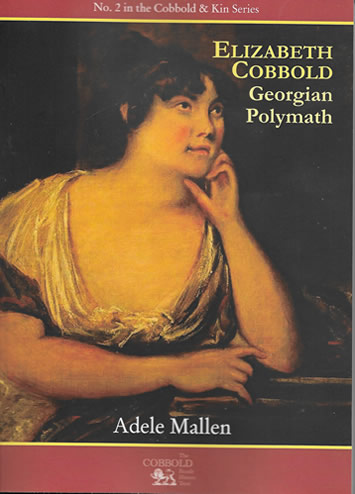- Screen Colours:
- Normal
- Black & Yellow
 This book by Adele Mallen is the second in the Cobbold & Kin series published by the Cobbold Family History Trust.
This book by Adele Mallen is the second in the Cobbold & Kin series published by the Cobbold Family History Trust.
Born in London in 1765 and brought up mostly in Liverpool and Manchester, Elizabeth Knipe became the second wife of Ipswich brewer John Cobbold in 1791. She was an intelligent and free-thinking woman and the author devotes a chapter to each of her many accomplishments, setting them into their historical background – the Regency, French Revolution and Napoleonic Wars.
The story begins with Elizabeth Knipe’s early life as the daughter of a Liverpool merchant. She published a book of poetry by the time she was 18 and took a keen interest in the theatre and politics – with her abolitionist views of slavery evident in her writing. The family took holidays in the Lake District and Derbyshire where she became interested in landscape and botany and also met her first husband, William Clarke, an Ipswich customs officer and Portman. Their marriage in 1790 brought Elizabeth Knipe Clarke to Ipswich, though William, much older than her, died later that year. Fortunately, Elizabeth stayed here and soon became Elizabeth Knipe Cobbold.
Perhaps because her life was more settled (her father had moved around a lot) or because she had to stay put to look after her 15 step-children (plus adding 7 of her own) and certainly because her husband allowed it (in law she was her husband’s possession), Elizabeth Knipe Cobbold’s creativity flourished after her marriage into the Cobbold family. The author devotes 20+ pages to her prolific production of poetry at this time and her interest in the theatre in Ipswich and Norwich. There is also a detailed chapter on her paper cut silhouettes, used as Valentines at her ‘reputed’ Ipswich parties and one on her famous servant Margaret Catchpole.
Elizabeth Knipe Cobbold was a scientific pioneer and whilst in Ipswich she took part in the ‘Enlightenment’ with great enthusiasm. The chapter on her science, though perhaps not so detailed as the others*, covers her correspondence and exchange of specimens with Sir James Smith, founder of the Linnaean Society and Gideon Mantell who pioneered the study of dinosaurs. She collected fossil shells in the crag sands in the Cobbold’s Holywells estate and they were published (from 1812) by James Sowerby in the first comprehensive palaeontological publication in this country, ‘The Mineral Conchology of Great Britain’.
This is a well- researched book – it is good to see this highly talented Ipswich woman being given the recognition she deserves. It costs £10 and can be bought from the Ipswich Tourist Information Centre or online from www.cobboldfht.com.
Caroline Markham
[*for more on Elizabeth Knipe Cobbold’s science see Bob Markham’s GeoSuffolk Notes no.70 at www.geosuffolk.co.uk/index.php/archive/geosuffolk-notes]